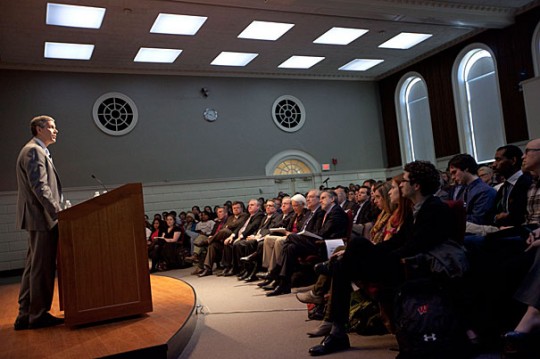Duncan urges experiments in education.
Duncan urges experiments in education.
Education secretary offers proposals to aid nation’s students.

Kris Snibbe/Harvard Staff Photographer/ “It’s a stain on our nation that today one in four American students fails to finish high school on time or drops out … that is absolutely morally unacceptable and economically unsustainable,” U.S. Secretary of Education Arne Duncan told his Harvard audience.
U.S. Secretary of Education Arne Duncan would like to see reform of the nation’s public educational system, and he urged administrators, educators, politicians, and parents to work together to overcome the nation’s tough educational challenges.
“It’s a stain on our nation that today one in four American students fails to finish high school on time or drops out … that is absolutely morally unacceptable and economically unsustainable,” Duncan told a crowd Monday at the Harvard Graduate School of Education’s Longfellow Hall.
In an Askwith Forum talk titled “Fighting the Wrong Education Battles,” he said that too often “well-intentioned advocacy goes awry.” Frequently, decision-makers search for an ideal solution to educational reform instead of collaborating and compromising on “imperfect” but important initiatives that could bring lasting change.
“We shouldn’t be asking, ‘Is this the perfect solution?’ We should be asking, ‘Is this a much better solution? Can it help us challenge the status quo and accelerate student achievement?’”
Stakeholders must consider in- and out-of-school influences as part of that overall solution, said Duncan. While poverty greatly affects a child’s performance, great schools and teachers are the “most effective anti-poverty tool of all.” He suggested creating full-service community schools that can offer educational as well as health and social services to disadvantaged children, and pointed to the Obama administration’s Promise Neighborhoods, an initiative that funds organizations that develop similar, inclusive school models.
Reform also involves developing rigorous assessments and college and career-ready academic standards like those created by the Massachusetts educational system, said Duncan. Boosting student achievement is not an “either/or solution,” he said. “Educators and the broader community should be attacking both in-school and out-of-school causes of low academic achievement.”
For Duncan, the argument over whether teacher evaluations should include measures of student achievement is another “false choice.”
Critics of standardized tests are right to complain that such tests are flawed can’t accurately gauge factors like “classroom management, teamwork, collaboration, and individualized instruction,” said Duncan. He acknowledged that teacher evaluations must never be based solely on test scores and should include principal observations, peer reviews, student work, and surveys.
“Still, the shortcomings of today’s tests,” he said, “doesn’t mean we should simply abandon the use of standardized testing.”
Another important part of education reform involves getting managers and labor leaders to work together to engage in “tough-minded collaboration and step outside of their comfort zones,” Duncan said.
He suggested that No Child Left Behind, the 2001 act that includes educational reforms that critics say place too much emphasis on testing and standardized measures, is “fundamentally broken.” Duncan said that states, districts, neighborhoods, and schools need to be held to rigorous standards, but simultaneously be given room to find their own means of meeting high benchmarks.
“In my mind, it’s tight on goals, being absolutely clear about goals, but give folks a lot more room to hit them.”
By Colleen Walsh
Harvard Staff Writer
###
About Harvard University.
Established in 1636, Harvard is the oldest institution of higher education in the United States. The University, which is based in Cambridge and Boston, Massachusetts, has an enrollment of over 20,000 degree candidates, including undergraduate, graduate, and professional students. Harvard has more than 360,000 alumni around the world.
Harvard University is devoted to excellence in teaching, learning, and research, and to developing leaders in many disciplines who make a difference globally. Harvard faculty are engaged with teaching and research to push the boundaries of human knowledge. For students who are excited to investigate the biggest issues of the 21st century, Harvard offers an unparalleled student experience and a generous financial aid program, with over $160 million awarded to more than 60% of our undergraduate students. The University has twelve degree-granting Schools in addition to the Radcliffe Institute for Advanced Study, offering a truly global education.
‘Universities nurture the hopes of the world: in solving challenges that cross borders; in unlocking and harnessing new knowledge; in building cultural and political understanding; and in modeling environments that promote dialogue and debate… The ideal and breadth of liberal education that embraces the humanities and arts as well as the social and natural sciences is at the core of Harvard’s philosophy. ’/ Drew Gilpin Faust
More About Harvard University & About Harvard University. Information.
###
* The above story is adapted from materials provided by Harvard University
_________________________________________________________________




















